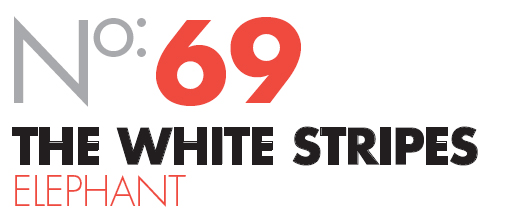
XL
Produced by Jack White
Released: April 2003
TRACKLISTING
01 Seven Nation Army
02 Black Math
03 There’s No Home for You Here
04 I Just Don’t Know What to Do with Myself
05 In the Cold, Cold Night
06 I Want to Be the Boy to Warm Your Mother’s Heart
07 You’ve Got Her in Your Pocket
08 Ball and Biscuit
09 The Hardest Button to Button
10 Little Acorns
11 Hypnotize
12 The Air Near My Fingers
13 Girl, You Have No Faith in Medicine
14 It’s True That We Love One Another
‘What is recording?’ the White Stripes’ Jack White rhetorically asked journalist Barney Hoskyns. ‘Is it a record of something that actually happened or is it a complete fallacy? What’s it like to grow up in a generation where you don’t know what instrument you’re hearing on the radio? You just hear that noise and you don’t know what’s making it. And you don’t care. I can’t imagine being a young musician and not caring what makes that sound. You used to hear someone playing an oboe and you’d think, “I can’t believe what he’s doing on the oboe”. Now it’s like, “Can you believe what he’s doing with ProTools?”. I mean, it’s hard to respect that.’
The White Stripes were one of the biggest bands of the early 21st century but it was an unlikely set up – just Meg White on drums and Jack White playing guitar or piano. The extreme minimalism was like a breath of fresh air on their early albums The White Stripes (1999), De Stijl (2000) and White Blood Cells (2001). In his early work, White acknowledged a debt to pre-war bluesmen like Blind Willie McTell, Son House and Robert Johnson, but there was also some Howlin’ Wolf thrown in for a bit of salt.

Going back to the blues did a number of things for the White Stripes: it set them apart as musically literate and of course nothing appeals to rock critics more than citing Blind Willie McTell. It gave them a well of stories and imagery to draw from, but it was also a challenge to do something new with a form that had been wrung dry. White somehow pulled it off and created a blues music that had never been heard before.
A love of old blues determined the White Stripes’ direction: rough, organic sounds recorded on analogue equipment rather than the prevailing digital technology and typically Elephant was recorded in a tiny eight-track studio. ‘If we can’t produce something that sounds good under those conditions, then it’s not real to begin with,’ said White at the time of the album’s release. ‘Getting involved with computers is getting involved with excess, especially when you start changing drumbeats to make them perfect or make the vocal melody completely in tune with some programme – it’s so far away from honesty.’
The album was supposedly about the ‘death of the sweetheart’ and certainly there are songs that hark back to antique sensibilities, but the overall attack from the Whites is decidedly modern.
The mystery Jack White peddled was romance. The relationship between the Whites was a matter of regular speculation that Jack refused to clarify, insisting that all you need to know is in the songs, which were certainly romantic in every sense of that word. ‘All music and art comes down to love,’ he said. ‘You just find out how to tell that story. That’s the oldest story in the book.’
The lead single, ‘Seven Nation Army’, sounds like it could have been recorded by Howlin’ Wolf with its stomping beat and razor wire guitar. But then again it couldn’t. Messing with history was one of the other intriguing things about Jack White.
‘The intent to push forward in the era after Warhol, Dylan, and the Beatles is a tricky one,’ he told Hoskyns. ‘I’m not too sure what “forward” is anymore. I think inward is a better direction, getting more soulful and away from plastic computer production.’